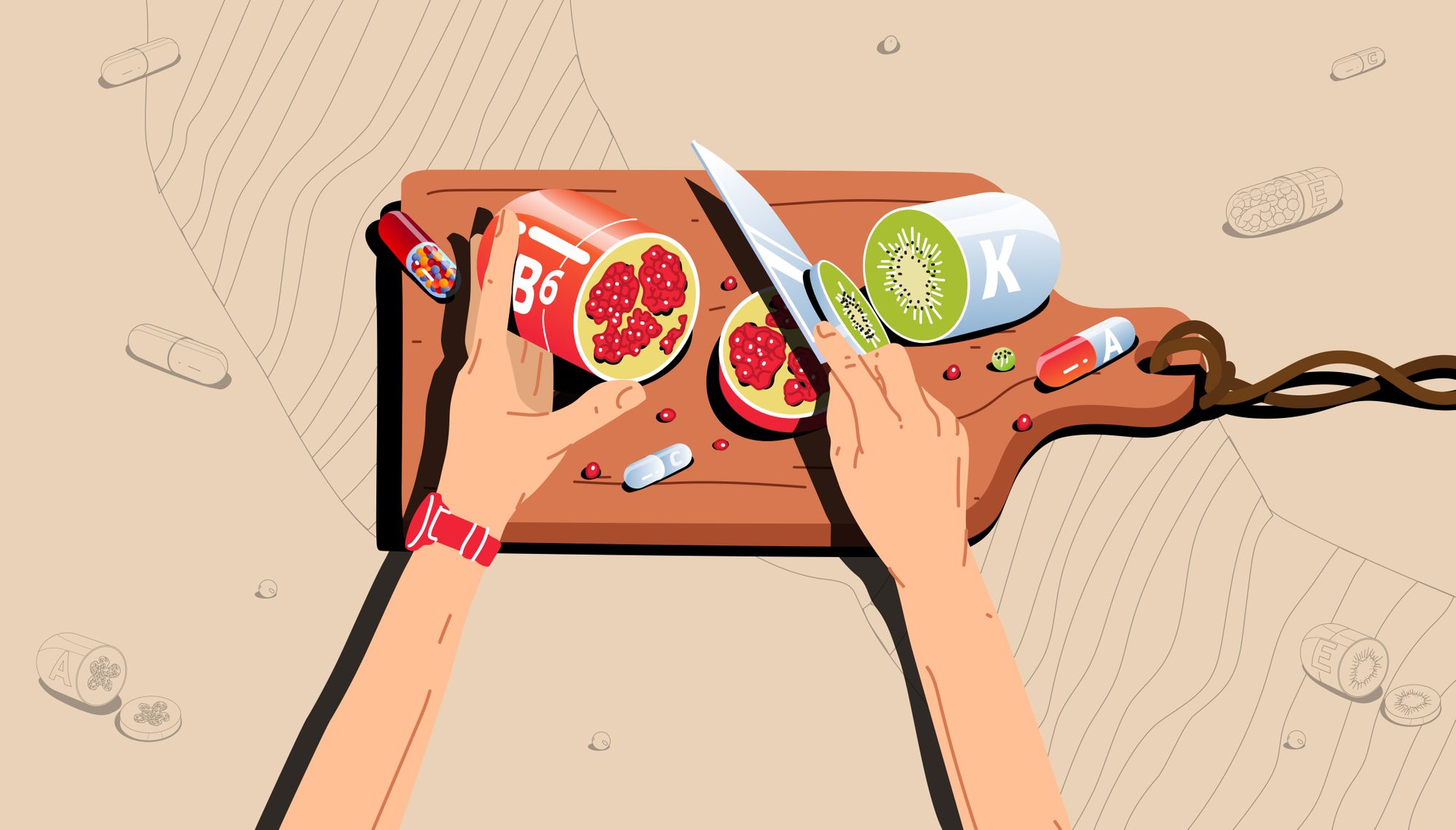Vitamins are an essential nutrient that humans need to stay healthy and feel good.
According to the National Institute of Health, there are 13 vitamins in total and each of them has special benefits.
Disclaimer
Before taking any vitamin supplements, talk to your healthcare provider about their necessity. Supplements can’t take the place of eating a variety of foods. Also, taking some vitamins in excess may be harmful!
Vitamin A or retinol
Vitamin A is a fat-soluble vitamin essential to our health and it has several important functions in the body. First, it helps you to see. Vitamin A is critical for vision because it supports the conjunctival membranes and cornea. It also promotes normal growth and health of the body cells, therefore it keeps your skin and the lining of some parts of the body healthy.
Taking large doses of retinol, however, may cause nausea, vomiting, headaches, dry skin and other problems.
Vitamin B1 or thiamin
This vitamin plays a critical role in metabolism — it helps the body’s cells turn carbohydrates into energy. Thiamin is also important for muscle contraction and conducting nerve signals.
Food sources of thiamin include whole grains, meat, and fish. Three ounces of cooked pork chops or trout contain 33% your recommended daily value. There are a lot of products enriched with Vitamin B1 like breakfast cereals, white rice, and bread.
Food sources of thiamin include whole grains, meat, and fish. Three ounces of cooked pork chops or trout contain 33% your recommended daily value. There are a lot of products enriched with Vitamin B1 like breakfast cereals, white rice, and bread.
Vitamin B2 or riboflavin
This vitamin is an essential component of energy production, cellular function, growth, and development. It also aids the release of energy from proteins.
Eggs, organ meats (kidneys and liver), lean meats, and milk are particularly rich in riboflavin. Green vegetables and mushrooms are a good source of Vitamin B2 too. In many countries, grains and cereals are fortified with riboflavin.
Vitamin B3 or vitamin PP or niacin
Niacin is made and used by your body to turn food into energy. It helps keep your nervous system, digestive system and skin healthy.
Most people get enough niacin from the food they eat. Foods rich in niacin include meat, fish, milk, eggs, green vegetables, and cereal grains. Vitamin B3 is also produced in the body from tryptophan, which is found in high-protein foods.
High doses of niacin, however, can cause uncomfortable symptoms, such as nausea and vomiting, abdominal pain, diarrhea and others.
Vitamin B5 or pantothenic acid
Pantothenic acid has several functions, such as helping release energy from food. It’s also required for making fatty acids and producing hormones and cholesterol.
Vitamin B5 is found in almost all meats, vegetables and mushrooms. Three ounces of boiled beef liver contain 166% of your recommended daily value and one raw avocado contains 40%.
Vitamin B6 or pyridoxine
This vitamin helps your immune system produce antibodies and haemoglobin. Antibodies are substances that fight many diseases and inflammations. Haemoglobin carries oxygen in red blood cells to tissues.
If you are taking a Vitamin B6 supplement, it’s important not to take too much. The long-term effects of high doses of pyridoxine can include losing control of bodily movements (ataxia).
Vitamin B7 or biotin
Your body needs biotin to metabolize fatty acids, glucose, and amino acids. Biotin helps your genes and DNA work properly as well.
Most biotin in foods is bound to protein, although some dietary biotin is in its free form. This vitamin is produced by bacteria in your gut and it’s not clear if you need any additional biotin from your diet.
Some foods contain biotin in small amounts: these organ meats, eggs, fish, meat, seeds, nuts and certain vegetables (like sweet potatoes).
Biotin deficiency is extremely rare. It has never been reported in healthy people eating a normal mixed diet.
Vitamin B9 or folate or folic acid
It helps the body make healthy new cells, therefore, is very important when a woman is preparing for pregnancy and when she is pregnant. Getting enough folic acid can prevent major birth defects in the baby’s brain or spine. Men should get enough folate too. It’s probably involved in sperm production.
Foods with folic acid in them include leafy green vegetables, fruits, dried beans, peas, and nuts. Fruits rich in folate include oranges, lemons, bananas, melons, and strawberries.

For instance, a half cup of boiled spinach contains 33% of your recommended daily value. Four spears of boiled asparagus contain 22%, and one cup of shredded romaine lettuce contains 16%. There are also folate-enriched bread, cereals and other grain products available on the market.
Isolated folate deficiency is uncommon. But if you worry that you don’t get enough folic acid from the foods you eat, you can also take it as a dietary supplement.
If you’re pregnant or trying for a baby, it’s recommended to take a 400mcg folic acid supplement daily from the time you stop using contraception until you’re 12 weeks pregnant.
Vitamin B12 or cobalamin
Vitamin B12 plays an essential role in red blood cell formation, cell metabolism, nerve function and the production of DNA. The human body is capable of storing enough vitamin B12 for several years, so deficiency is rare. However, if you are a vegetarian or vegan, you might be prone to deficiency because plant foods don’t contain vitamin B12.
Most people get enough vitamin B12 from their regular diet. It is naturally found in animal products, including fish, meat, poultry, eggs, milk, and milk products. 3 ounces of cooked beef liver contains 2500% of the daily recommended value. Three ounces of cooked trout may contain 100-225% and one large hard-boiled egg contains 25%.
There are a lot of foods fortified with 100% of the daily value that is suitable for vegetarians and vegans, such as soy milk or breakfast cereals.
Vitamin C or ascorbic acid
Vitamin C is a water-soluble vitamin. It is essential for normal growth, healing wounds, repairing and maintaining cartilage, bones and teeth. Humans are unable to synthesize and store vitamin C, so it is an essential component of our daily diet. Vitamin C is also an antioxidant that helps the body reduce damage caused by free radicals.
The best sources of vitamin C are fruits and vegetables. One small (raw) red bell pepper contains 106% of your daily recommended value, one medium orange contains 78%, and a half cup of cooked broccoli contains 57%.
Vitamin C deficiency is quite uncommon in developed countries.
Vitamin D
Vitamin D helps regulate the amount of calcium and phosphate that are needed to keep bones, teeth, and muscles healthy. Vitamin D has other roles in the body, including the modulation of cell growth, neuromuscular and immune function, and reducing inflammation.
There are not too many foods that contain Vitamin D. The flesh of fatty fish, such as salmon, tuna, and mackerel, and fish liver oils are the best sources in the diet. But vitamin D can also be produced by ultraviolet rays when they strike the skin.
Most bodies can make enough vitamin D from being out in the sun daily even for short periods of time. If you live in a country with a cold climate, however, you should be concerned about getting enough vitamin D.
The Scientific Advisory Committee on Nutrition (SACN) recommends that all adults living in the UK taking a daily supplement of about 400IU or 10mcg of vitamin D throughout the year, especially during the winter months.
Vitamin E
Vitamin E is the collective name for a group of fat-soluble compounds with antioxidant activities. It helps maintain healthy skin and eyes, and it strengthens the immune system to fight against illness and infection.
Numerous foods provide vitamin E; vegetable oils, nuts and seeds, and leafy greens are good sources of it. A single tablespoon of wheat germ oil contains 135% of your daily recommendation, and one ounce of dry roasted sunflower seeds or almonds contains 45–50%.
Vitamin E deficiency is rare. People get enough of it through their regular diet, except people with certain disorders such as liver disease, cystic fibrosis, and Crohn’s disease. These folks may need extra vitamin E.
Vitamin K
Vitamin K helps your blood to clot, so it’s really important for healing wounds. Vitamin K aids your body by making proteins for healthy bones and tissues.
There are different types of vitamin K. Most people get vitamin K from green leafy vegetables, vegetable oils, and some fruits. One cup of raw spinach contains 121% of your daily recommendation, a half cup of boiled broccoli contains 92% and a half cup of roasted soybeans contains 36%. Bacteria in your gut also produce small amounts of another type of vitamin K.
Vitamin K is a fat-soluble vitamin, and it is stored in the liver. Therefore, there is no need to add it to your diet every day. Newborns have very little of it. They usually get a shot of vitamin K soon after they are born.
🍎 Your genes and gut bacteria composition do have an impact on the absorption and synthesis of different nutrients. To stay healthy, it’s important to know your predisposition to low, average or high levels of vitamins. This information can help you improve your diet and make it much more personalized.
- Vitamin A. Fact Sheet for Consumers.
- Thiamin. Fact Sheet for Consumers.
- Riboflavin. Fact Sheet for Consumers.
- Niacin.
- Pantothenic Acid. Fact Sheet for Consumers.
- Vitamin B6. Fact Sheet for Consumers.
- Biotin. Fact Sheet for Consumers.
- Folate. Fact Sheet for Consumers.
- Vitamin B12. Fact Sheet for Consumers.
- Vitamin C. Fact Sheet for Consumers.
- Vitamin D. Fact Sheet for Consumers.
- Vitamin E. Fact Sheet for Consumers.
- Vitamin K. Fact Sheet for Consumers.
- Vitamins and minerals.
- Vitamin D and Health.
















